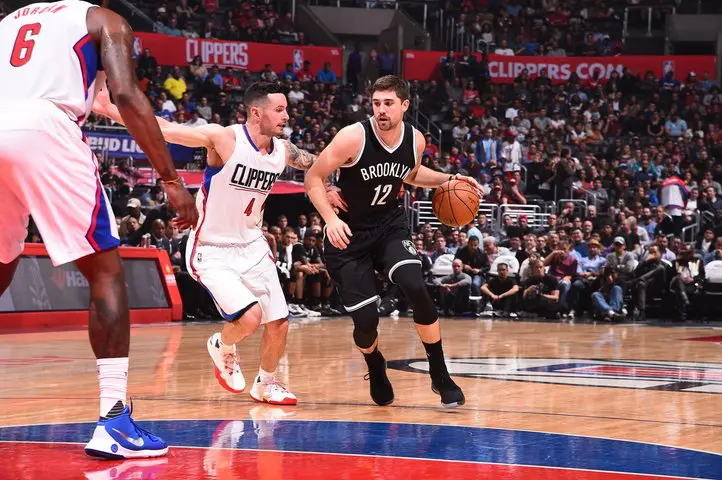Joe Harris’ emergence as a reliable threat from beyond the arc has seen his stock rise this season. With Harris seeking a contract extension, his play so far merits a future spot in the NBA.
Joe Harris has come a long way in four short years. A second round pick in the 2014 draft, Harris spent his first two seasons in basketball solitude with the Cleveland Cavaliers. He showed flashes of offensive potential but Cleveland prioritised titles over development. He was traded to the Orlando Magic in 2016 and subsequently waived.
In the offseason of 2016, Brooklyn signed Harris as a free agent but it didn’t come without reservations. He was a 6’6 guard with a 6’6 wingspan and below average athleticism. In a league abundant in size, length and athletic ability, Harris’ defensive ceiling was low. Despite this, the Nets took a chance on his shooting ability from range and he hasn’t looked back.
Since his arrival, Harris has continued to improve in Brooklyn’s system.
2016-2017 Stats: 8.2 points, 2.8 rebounds, 1.0 assists in 21.4 minutes per game.
Shooting 42.5 percent from the field, 38.5 percent from three and 71.4 percent on free throws.
2017-2018 Stats: 10.3 points, 3.1 rebounds, 1.4 assists in 24.8 minutes per game.
Shooting 48.3 percent from the field, 40.4 precent from three and 78.2 percent on free throws.
At this juncture, Harris is on track to have a career year across the board.
Strength:
Three-point shooting
Harris has established himself as a legitimate threat from beyond the arc, posting a career high 40.4 percent on 4.8 attempts per game. He is converting 38.7 percent on catch and shoot threes, 41.7 percent on open looks (defender with four to six feet) and 47.3 percent on wide open shots (no defender within six or more feet).
In his most recent performance, Harris posted 19 points off the bench against the Oklahoma City Thunder. He shot 7-10 from the field and a perfect 5-5 from three.
Weaknesses:
Defense
Despite making progress in this area, Harris’ is still a below average defender by NBA standards. Short arms, poor lateral movement and anticipation hinder his ability to defend guards with elite athletic ability. Smaller guards with speed are able to create separation with ease or blow by him with a. quick first step. Harris is heavy footed, making it tough to recover if he’s beaten off the dribble.
Additionally, Harris isn’t overly strong. When opposing teams switch, he is regularly overpowered on the block and offers very little resistance. While he is a shooting guard and isn’t expected to stop forwards on the block, offering SOME resistance is better than no resistance. With a lack of athleticism, Harris needs to pack on some muscle to at least make it difficult for opposing players to get to the hole.
Passive playmaker
During his time at the University of Virginia, Harris showed flashes of playmaking. He was able to move the ball and play well in a system, regularly finding the open man for easy looks. Harris averaged 3.5 assists per 40 minutes and although that isn’t great, he was playing small forward and was a third or fourth option handling the ball.
His time in Brooklyn has shown a very different story. Despite his effectiveness on straight line drives, Harris is content serving as a one dimensional spot-up shooter. He rarely drives and kicks, makes the extra pass to the open man and seems to prefer shooting the ball as soon as he touches it. Harris needs to be more aggressive attacking the paint and develop crafty ways to get to the rack. Although he is averaging a career high 1.3 assists per game this season, that is low for a player who plays almost 25 minutes a night.
Best Performance
Easily his best all round performance came in the loss to the Cleveland Cavaliers. Here, Harris posted 18 points (7-10 from the field, 4-7 from three, 0-2 FT), 4 assists, 5 rebounds, 2 steals and 1 block in 29 minutes.
If he can find this type of performance regularly, Harris will find himself as a borderline starter or sixth man.
The Future:
With the trade deadline less than three weeks away, Harris represents some real value on the market. If the Nets are determined to rebuild through the draft, moving him is the best option. Teams are always searching for reliable outside shooting and Harris has solidified himself as a genuine sniper.
The Milwaukee Bucks, New Orleans Pelicans and Minnesota Timberwolves are in dire need of outside shooting. With all three franchises possessing their first round picks for next years draft, Harris could be moved if these teams show interest.
If Brooklyn decides to keep him, he will be due a substantial raise. Harris’ play this season has shot is stock up 10-fold and plenty of teams will be interested when he hits free agency.
Harris has surprised this season and is making shots with a make or miss mentality. He has been excellent this season so far and continues to show improvement.
Season Grade: A
All Stats courtesy of NBA.com

